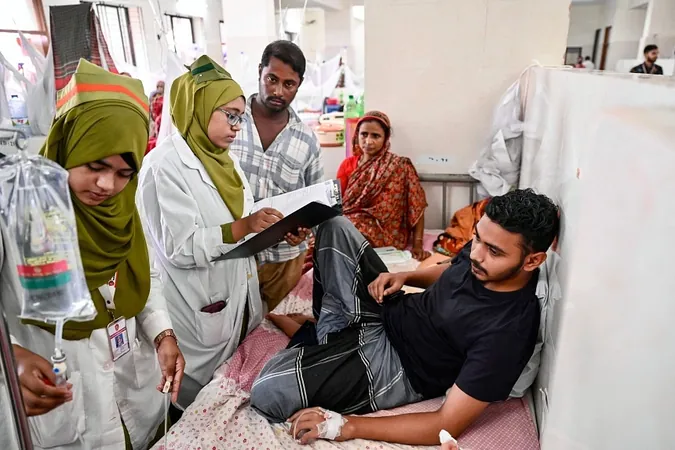
WHO Unveils Bold Strategy to Combat Alarming Surge in Dengue Cases Due to Climate Change
2024-10-03
Author: Rajesh
Introduction
In a groundbreaking announcement made on October 3, 2024, the World Health Organization (WHO) has launched an urgent global initiative to tackle the escalating threat of dengue fever and other mosquito-borne diseases. With climate change playing a pivotal role in the rapid proliferation of these diseases, WHO Chief Tedros Adhanom Ghebreyesus emphasized the pressing need for an integrated response that transcends borders and sectors.
Alarming Statistics
The statistics unveil a startling reality: the number of reported dengue cases has surged disproportionately, nearly doubling since 2021, with an alarming total of over 12.3 million cases and more than 7,900 deaths documented in just the first eight months of 2024. This figure is already almost double the total of 6.5 million cases recorded throughout 2023, underscoring a worrying trend that demands immediate action.
Understanding Dengue Fever
Dengue fever typically manifests with high fever and debilitating body aches, yet a significant portion of the infected population remains asymptomatic. The WHO estimates between 100 million and 400 million dengue infections annually, which signals an urgent need for public awareness and preventive measures.
The Aedes Aegypti Vector
The organization has identified the Aedes aegypti mosquito as the primary vector for the dengue virus, which has expanded its habitat due to rising global temperatures. Contributing factors such as unplanned urbanization, inadequate sanitation, and the ease of international travel have aided in the rapid dissemination of this perilous disease, which has now become endemic in over 130 countries.
Global Risk
Currently, approximately four billion people around the world are at risk of contracting dengue and other arboviral diseases like chikungunya and Zika. Alarmingly, this figure is expected to increase to five billion by 2050 if decisive actions are not taken.
A $71 Million Roadmap to Recovery
In response to this urgent health crisis, the WHO has devised a comprehensive plan requiring an estimated $55 million (approximately S$71 million) in funding for the upcoming year. This strategy aims to enhance disease surveillance, bolster laboratory resources, enforce effective vector control measures, and accelerate research and development for improved treatments and vaccines.
Call to Action
Dr. Ghebreyesus remarked, "From maintaining clean surroundings to supporting vector control initiatives and ensuring timely medical attention, every individual has a vital role to play in combating dengue." He characterized this plan as a roadmap meant to stem the tide against dengue and other Aedes-borne diseases, safeguarding vulnerable populations and paving the way for a healthier future.
Conclusion
As the world grapples with the implications of climate change on public health, the WHO's proactive approach to rein in dengue spread could serve as a crucial turning point in the fight against vector-borne diseases. The question looms: will global communities unite to take action before it’s too late?





 Brasil (PT)
Brasil (PT)
 Canada (EN)
Canada (EN)
 Chile (ES)
Chile (ES)
 España (ES)
España (ES)
 France (FR)
France (FR)
 Hong Kong (EN)
Hong Kong (EN)
 Italia (IT)
Italia (IT)
 日本 (JA)
日本 (JA)
 Magyarország (HU)
Magyarország (HU)
 Norge (NO)
Norge (NO)
 Polska (PL)
Polska (PL)
 Schweiz (DE)
Schweiz (DE)
 Singapore (EN)
Singapore (EN)
 Sverige (SV)
Sverige (SV)
 Suomi (FI)
Suomi (FI)
 Türkiye (TR)
Türkiye (TR)